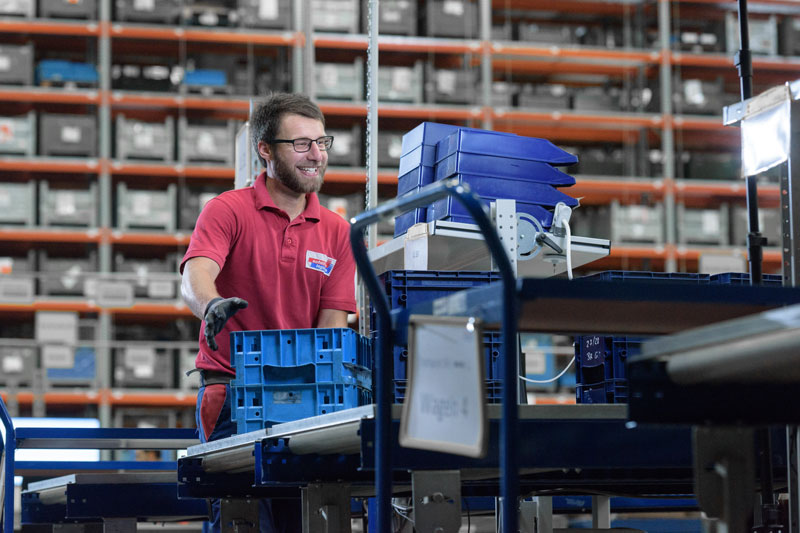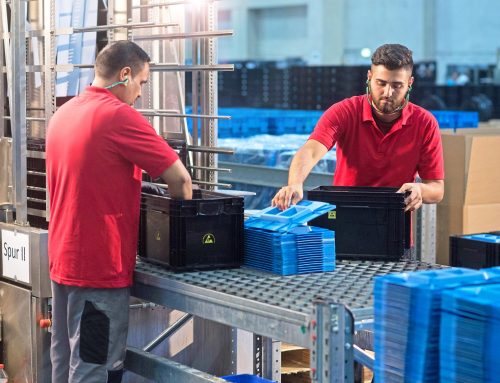What is container management and why is it so important in logistics?
The world of logistics is complex and diverse, and there are many factors that ensure smooth processes. One of these crucial factors is container management, which is often overshadowed by the big logistics issues, but is of immense importance. In this article, we will take a closer look at what container management is and why it is so crucial in logistics.
The world of reusable containers
Reusable containers, also known as returnable transport items (RTI), reusable loading equipment or load carriers, are primarily at home in the automotive industry, but are increasingly being used in other sectors too. These containers are divided into two main categories: Small load carriers (SLC) and large load carriers (GLT), although they also go by other names such as shepherd’s crates and special load carriers. Their main purpose is to store, pack and transport goods, making them indispensable tools for logistics in these industries. The planning, control and monitoring of these container flows is called container management.
The goal of container management
The central aim of container management is to determine the specific need for reusable load carriers and to optimise the processes surrounding their use. Why is this so important? Because these containers are moved back and forth between customers, suppliers and the company itself. Container management creates transparency in these container flows and ensures that they are handled efficiently. One particular challenge is to optimise container utilisation. In times of fluctuating sales and production volumes, it can happen that load carriers remain unused for long periods of time or take up valuable storage space. This ties up capital that could be better utilised elsewhere.
The versatility of containers
Containers come in different sizes and shapes and are precisely defined in logistics. They are a means of grouping goods, which includes pallets and containers, but also reusable containers such as RTIs. The standardisation of these load carriers has one major advantage: it enables extensive automation of the material flow, transport, storage and retrieval across the entire value chain. This standardises and automates storage systems. These load carriers play a crucial role in various industrial sectors, both in the production process and in storage, transport and the aftermarket. They ensure that fragile parts can be stored and transported safely and professionally.
Why container management is essential
In industry, these various load carriers are of great importance, which is why effective container management is indispensable. It enables companies to optimise the need for reusable load carriers and to handle the container flows between customers, suppliers and their own company transparently.
Cost optimisation through container management
Business processes, demand, orders, deliveries and production are constantly changing and not always predictable. This means that the required quantities and formats of containers in manufacturing companies often change. While more boxes and storage equipment are needed in phases of high production, they tie up capital unnecessarily in phases of lower demand and, in the worst case, take up storage space. Ideally, companies can adjust their container stocks in the short or long term, e.g. through flexible booking via a service provider or by renting the entire container stock. On the other hand, surplus containers can be rented or sold to free up capital. The maintenance, control and cleaning of RTIs is also of great importance. Here, service providers such as Sprintbox can be engaged to outsource container cleaning. Container management as a whole offers potential for cost optimisation and can help companies to free up capital.
Increase liquidity through sale-and-lease-back
For companies that want to completely outsource their container stocks and container management, there is the so-called sale-and-lease-back process. This involves selling their own containers to a service provider and then renting them flexibly from them. When renting containers, it is important to ensure that cleaning, maintenance, provision and technical development are also covered. This approach can help to free up capital in the long term.
Conclusion
In the world of logistics, reusable containers are an inconspicuous but crucial component. Container management is the key to optimising processes, saving costs and increasing liquidity. Companies should therefore give this often overlooked topic the attention it deserves. Further information on holistic container management can be found here. If you would like to find out more about how you can successfully implement container management in your company, we will be happy to help. Container management is not only a logistical necessity, but also an opportunity to increase your efficiency and make your company more sustainable.










